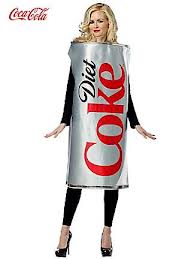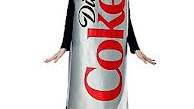Diet Soda: Sweet Words and Sour Reality
In an age of free and easy information people are becoming more aware of what they’re putting into and onto their bodies. The multitudes are waking up to the pluses and perils of food, drink, cosmetics and a litany of other products that get packaged and pushed onto us daily. How do you like me now? What if I stand like this? |
Coke probably feels the pinch of a public waking up to the alarming amounts of sugar, sugar substitute, and chemicals that go into their drinks.
To much controversy, in a bid to curb growing obesity and ill health, in 2012 NY Mayor Michael Bloomberg banned the sale of large sized sodas and sugary drinks in "restaurants, street carts and movie theaters, the first restriction of its kind in the country. " Source
So now in a recent ad campaign, Coca Cola seems to be trying their best to promote their products without SEEMING like they’re promoting unhealthy lifestyle.
Here’s their new ad:
Some are calling Coke out on the disingenuous arguments, the propaganda of nostalgia, and the hypocrisy.
Deborah Kotz of Boston.com writes:
"Coke commercial set to air on Monday night in which the company appears to fall on its sword admitting that it’s at least partly to blame for the nation’s obesity epidemic.
The narrator, with her soothing feminine voice, expresses concern for how much weight we’ve gained as a nation and how much Coke is doing to be a part of the solution: increasing the number of low calorie and no-calorie beverages, reducing the amount in serving-size bottles, and putting calorie counts on the front of beverage labels.
But she gets her digs in too reminding us right off the bat that Coke has been around for 125 years. Since the obesity problem only started in the 1970’s, the implication is that clearly Coke couldn’t be the culprit.
[...]
We’re also told by the Coke manufacturer that it “will take action by all of us” to fix the crisis as images of kids exercising flash on the screen. Implication: Don’t blame sugar-sweetened beverages; blame video games, television, and too much sitting around all day.
Following that bit of information, the narrator provides a condescending nutrition lecture on how “all calories count no matter where they come from.” While that’s technically true, the body benefits far more from the calories in a peach, carrot, or string bean, than from those found in carbonated sugar water.
No nutritionist would ever tell you that it’s okay to substitute calories from fruits and vegetables for soda in order to achieve weight loss."
 It’s a nice attempt by Coke, but some would say it’s either not enough, or it’s nearly negligent. Recently studies have shown that aspartame, sucralose and splenda, the ingredients found in these so-called ’healthier’ diet versions of sodas, can cause headaches, and weight gain. They have been linked to depression. Some studies even connect aspartame with cancer.
It’s a nice attempt by Coke, but some would say it’s either not enough, or it’s nearly negligent. Recently studies have shown that aspartame, sucralose and splenda, the ingredients found in these so-called ’healthier’ diet versions of sodas, can cause headaches, and weight gain. They have been linked to depression. Some studies even connect aspartame with cancer.In 2012 The American Stroke Association presented a study from the Journal of General Internal Medicine that demonstrated a connection between diet sodas and a 44% heightened risk of heart attack and stroke.
Admittedly, for this viewer, the sight of bottles of ’diet’ soda being loaded into school vending machines as a ’healthy alternative’ in the ad is troubling, frustrating, and dismaying all at once.
LiveScience speaks out on this specious substitution:
"The proliferation of diet soda cuts to the core of what’s wrong with the Western diet. The Western approach is to remove the most obvious dangers from an unhealthy habit — in this case, removing the 12 teaspoons of sugar per can of fizzy water laced with acids, colors and flavors of uncertain origin — so that we can continue that habit in denial of other dangers.
The underlying problem is that we are addicted to sugar; beverages without a sweetener now seem bland. For the first million years or so of pre-human and human existence, water was adequate to quench our thirst. But apparently no longer.
Hold the sugar and corn syrup and pass the aspartame. Some doctors actually encourage dieters to drink diet soda to cut calories instead of recommending zero-calorie water or tea."
In all, Coke is a corporation that is trying to maintain a reputation in a climate where consumers are wising up to the negative effects of these products. In many ways however, it comes down to a matter of choice. Making healthy and informed choices has never been easier. Advertisements aside, you can choose to consume these beverages, or you can choose not to. The Coca Cola Corporation isn’t pouring these things down your throat. Yet.
By Elizabeth Leafloor, RedIceCreations.com






















